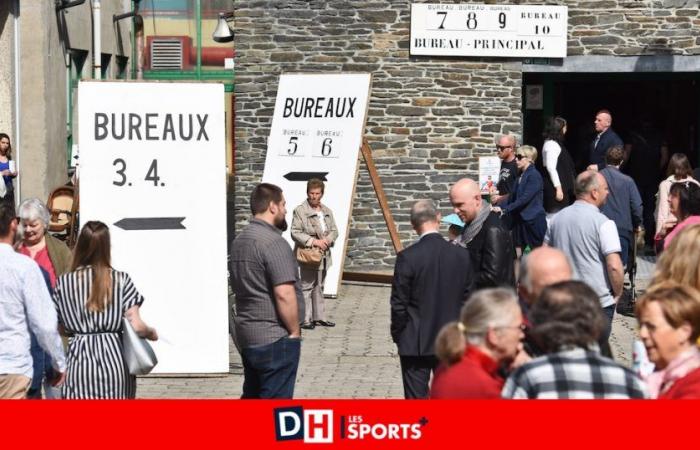1. Who are we voting for?
This Sunday, voters will travel for the municipal elections and the provincial elections. In the first case, they will elect municipal councilors. And indirectly the mayors and aldermen. With exceptions depending on the municipalities and regions (read below). In the second case, it is the provincial councilors and, indirectly, the provincial deputies and president of the provincial college. They are elected for six years.
2. Who can vote?
Belgians are automatically registered on the electoral lists if they are at least 18 years old on voting day. Foreign nationals domiciled in Belgium had to register in advance to be able to vote. To be able to vote, you must have your valid identity card (or passport) and your summons. The voter must vote in the municipality where he was domiciled on July 31. Which gives rise to absurd situations where a former Wavre resident having, for example, moved to Brussels in September, will have to vote in Wavre on Sunday. The voter must go to the voting booth alone. But in the case of a voter who finds it impossible to go to the voting booth alone or to cast their vote themselves (disability, illness, etc.), the president will authorize them to be accompanied. A voter cannot a priori be accompanied by their child even if office presidents are called upon to show tolerance.
We vote this Sunday: the challenges of the elections in Charleroi
3. Is voting compulsory in municipal elections?
This depends on the region in which you are domiciled. Voting on Sunday is compulsory in Wallonia and Brussels, but this is no longer the case in Flanders.
4. What if I don’t vote?
The Public Prosecutor will be informed and will invite you to provide the necessary supporting documents (illness, death of a loved one, etc.) which justify your absence. If he judges that your situation does not justify the fact of not having voted, a fine may be issued. It could rise to €200 in the event of a repeat offense. If this unjustified refusal to vote occurs at least four times in 15 years, you will be removed from the electoral register for ten years. In addition, during this period, you will not be able to receive any appointment, promotion, distinction from a public authority.
5. I am appointed assessor. But I don’t plan to go there
If you have received a summons to be an assessor or president of the polling station, you are legally obliged to assume this function, unless you have been exempted (for medical, professional or other reasons). If you do not come and assume this role this Sunday, sanctions may be imposed if your excuse is not deemed sufficient. If you do not stand as an assessor in the elections of October 13, 2024, you may be fined €250. Which can rise to €1,600 if you do not pay the fine and you are tried by a court. To this will be added legal costs.
“Fusion”, this swear word in Walloon
6. When should I go to vote?
In Brussels, where people vote electronically, polling stations will be open from 8 a.m. to 4 p.m. In Wallonia, where we still vote on paper, offices open at 8 a.m. and close at 2 p.m.
7. How is the mayor elected?
In Wallonia, it is the candidate who obtained the most preferential votes on the list of the majority having itself cast the most votes who will automatically be designated mayor. In the event of parity on the same list, the order of the list prevails. A similar situation happened in Jodoigne in 2018. Note that the candidate who obtains the most votes will not necessarily be mayor. If he is part of the minority or if he does not appear in the list of the majority having cast the most votes, he will not be mayor. This will also be the case in Flanders.
Let’s take a concrete case. Candidate Dupont had the best score in the municipality. If his party still ends up in opposition through alliances, Dupont will sit in opposition and will therefore not become mayor. If Dupont obtains the best score in the municipality and his list is part of the majority pact but another party obtained more votes, Dupont will not be mayor either.
In Brussels, it is the parties which negotiate the alliances which choose the mayor. A bit like the federal government system. It is therefore not necessarily the most popular candidate among voters who will be designated mayor. He is then appointed by the Brussels government after obtaining the support of the majority of elected officials on its list.
Note that in the municipalities with ease as well as in Comines, the voters directly appoint the aldermen. With a rather unexpected consequence: some aldermen may be part of the opposition, as is the case in Kraainem. It is the majority parties that appoint the mayor
The “crows” multiply with the arrival of the municipal elections
8. How are municipal councilors appointed?
They are directly elected by voters. Once the polling stations close, it’s time for the counting. And the distribution of seats operated via the d’Hondt key. We’ll give you the apothecary calculations: the more popular a list is among voters, the more seats it will win. Once these seats have been allocated for each list, the elected representatives of each list will be designated by the number of votes. Thus, a list which wins 8 seats will see its 8 highest scorers be designated municipal councilors, regardless of their initial place on the list. The number of municipal councilors varies from one municipality to another depending on their number of inhabitants.
9. How are aldermen appointed?
It is the municipal councilors who decide who will become alderman among the municipal councilors of the groups forming the majority pact. The number of aldermen varies according to the population of the municipality. From 3 to 10 aldermen in Wallonia. Two thirds must be of one sex, and one third of the other to ensure diversity.
10. Can an alderman or mayor not be part of the elected municipal councilors?
The mayor must have been elected municipal councilor. For the alderman, there is a specificity. The legislator has provided for this possibility in the unlikely but nevertheless not impossible case, particularly in the smallest municipalities, where the majority municipal councilors would all be of the same sex. The college of mayor and aldermen can then designate an unelected alderman of the opposite sex. He will have a deliberative voice within the College, and a consultative voice within the municipal council.






